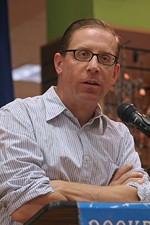On Death & Dying
Did TV Coverage Trivialize Barbara Jordan?
Fri., Feb. 2, 1996
Of course, local television news has its bad days, too.
You can mark down January 17th as one of the latter, the day that former U.S. Congresswoman Barbara Jordan passed away. A teacher at the University of Texas' LBJ School of Public Affairs since her retirement from the House of Representatives in 1978, Jordan died of pneumonia, a condition apparently augmented by her ongoing battle with leukemia. She also suffered from multiple sclerosis and had been confined to a wheelchair in her last years.
Given Jordan's national prominence as well as her numerous Austin ties, her death was the top story on all four of the 10pm newscasts of two Wednesdays ago. Not that such placement ensures more attention to detail or accuracy. Dick Ellis and Stephanie Rochan at KTBC, for instance, called her "one of America's most remarkable women." Their coverage included an interview with Bill Hobby, the former Texas legislator who was one of Jordan's colleagues at the LBJ School. Hobby professed his utter respect, retelling the humorous story of when she had rebuffed him for addressing her as a "Congressperson."
According to Channel 7's Rochan, Jordan "never shied from expressing her thoughts on tough topics like immigration and race relations. Nothing could stop this political pioneer, not even a crippling disease." Well, maybe a news program could. Statements like these beg the questions -- what were Jordan's thoughts on these issues, thoughts that she fought so hard to maintain, thoughts that apparently won her so much respect both locally and nationally, from liberals and conservatives alike? She must have had some pretty strong opinions to have generated this degree of adoration. Unfortunately, KTBC viewers were never given this information.
You wouldn't have learned much more by watching Channel 36, which tagged Jordan as a "Texas institution." Remembering her "eloquence at the Watergate impeachment hearings," the KXAN report included comments and reflections from Ann Richards and George W. Bush, as well as Land Commissioner Garry Mauro. While showing footage of Jordan speaking to the Democratic National Convention, she was remembered as a leader who embodied "wisdom, courage, passion and moral perspective."
Channel 36 differed significantly from its competitors by focusing on Jordan's "Christian ways." The pastor of a local Baptist church that had already completed a memorial service was interviewed, and he spoke of the decades in which he had observed her strong leadership. Although the memorial service had clearly concluded before the 10pm newscast began, KXAN's coverage of Jordan's passing was curiously punctuated by a live shot from this house of worship. When you're covering a death, there are only so many field shots to choose from.
Meanwhile, on CBS affiliate K-EYE, Jordan was characterized as a "trailblazing Texan" who was one of the "most inspirational women" in America. After lengthy interviews with many of her colleagues and admirers, people like Gov. Bush, Liz Carpenter, and J.J. "Jake" Pickle, the station ran a list of the various "firsts" she had accomplished in her long and distinguished political career.
K-EYE also focused extensively on Jordan's "tremendous legacy in shaping young minds." Comments were solicited from the new Barbara Jordan Elementary School. Young students remembered her kind words of encouragement when she had visited their classroom. Administrators recalled Jordan's impact in their decision to pursue teaching careers. Throughout the Channel 42 coverage, the former Congresswoman's command to "believe in yourself" was a constant refrain. This parade of emotion is impressive, but it is not overly fulfilling. After all, aside from the brief list of firsts, there is little raw information about Jordan's accomplishments.
As for Channel 24, they clearly devoted the most resources to covering this story, airing a 30-minute special on Jordan in addition to their regular news coverage. Unfortunately, much of what appeared on the KVUE newscast seemed mindless overkill. Betty Cross, for instance, reported on how the death was received at a Lady Longhorns basketball game, where this woman was apparently known as the "Courtside Congresswoman." Later, anchor Judy Maggio recounted the nervousness she experienced when she had first interviewed Jordan as a cub reporter. She confided that Jordan was a supportive presence, offering "precious words of wisdom that I still cherish today." What the words were, we will never know. Apparently they are still too precious for Maggio to share with viewers.
Still, this silliness reached its absolute nadir in a report filed by Channel 24's Shelton Greene. Greene was given the unenviable assignment of putting a human perspective on Jordan -- in other words, interview neighbors and friends who declined to speak on camera. The result? An inane video shot of Jordan's nondescript Manor home, first from far away, then from a closer view, then from far away, again. As the camera panned back and forth, the reporter revealed that Jordan's unassuming home and neighborhood "typified her love of privacy." How's that? Are we to assume that a less private person would have left the curtains drawn and the front door open?
The shrouded house report was particularly amusing in the face of KVUE's revamped strategy with regard to crime stories, one in which the station pledges to exercise significant restraint on events that do not meet five specific community importance criteria. Promising less sensationalism and more insight, this new approach to crime sounds like a wonderful change of pace, one that we hope will be adopted by the city's three other stations. Failing this, maybe these hard-nosed criteria will at least spread throughout the KVUE news room.
Today's television news rooms could use a host of other reforms as well, a point made all the more obvious when viewing coverage of Barbara Jordan's death. Over and over again, her peers told us how important a figure she was and how much her presence will be missed. Others remarked about her ongoing influence on a generation of young thinkers. But there's a missing link here. It's all analysis and no raw data. It's all spin and no information. Like so many other issues in American politics, the media sells the public short, telling us how to think but not trusting us with the ability to analyze the issues and come to that conclusion ourselves. n
Special thanks to Teleclip, which videotapes all local newscasts, for providing complete access to January 17 reports.
Got something to say on the subject? Send a letter to the editor.








